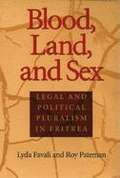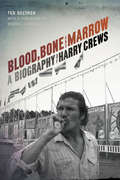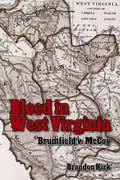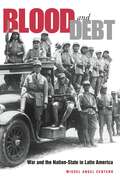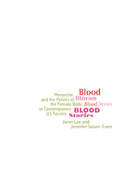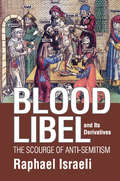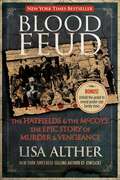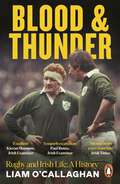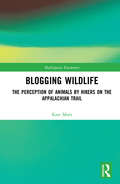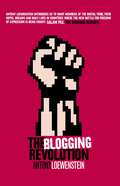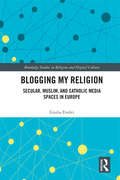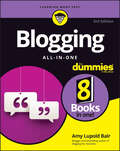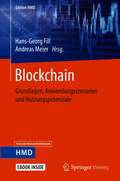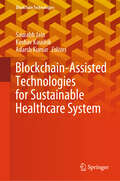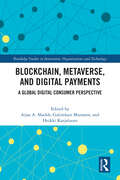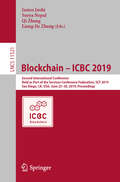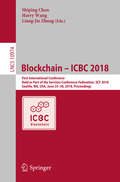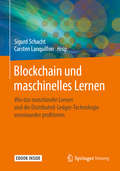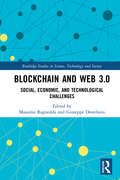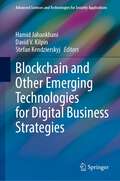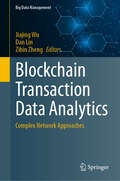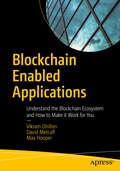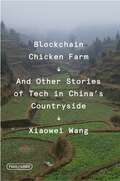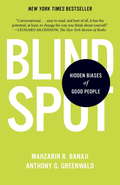- Table View
- List View
Blood, Land, and Sex: Legal and Political Pluralism in Eritrea
by Lyda Favali Roy PatemanEritrea is a small country in northeast Africa on the Red Sea across from Yemen; it has a population of about 3.5 million. Its capital is Asmara. Djibouti is to its southeast, Ethiopia to its south and Sudan to its west. Eritrea's population was in the past organized on the kinship system and has been under Italian and Ethiopian domination but is now independent. This small country has many languages, many customs and several religions. In Eritrea, State, traditional, and religious laws are equally prevalent, but any one legal system may be put into play depending upon the individual or individuals involved in a legal dispute. Because of conflicting laws, it has been difficult for Eritreans to come to a consensus on what constitutes their legal system. In this book, the authors examine the roles of the state, ethnic groups, religious groups, and the international community in several key areas of Eritrean law--blood feud and murder, land tenure, gender relations (marriage, prostitution, rape), and female genital mutilation. Favali and Pateman explore the intersections of the various laws and discuss how change can be brought to communities where legal ambiguity prevails, often to the grave harm of women and other powerless individuals. This significant book focuses on how Eritrea and other newly emerging democracies might build pluralist legal systems that will be acceptable to an ethnically and religiously diverse population. LYDA FAVALI is a lawyer and researcher at the University of Turin, Italy. ROY PATEMAN is Professor Emeritus of Political Science at the University of California, Los Angeles.
Blood, Bone, and Marrow: A Biography of Harry Crews
by Ted Geltner&“Brilliantly renders the life of the late writer Harry Crews . . . It captures the wild spirit of an unflinching American writer.&”—Publishers Weekly (starred review) In 2010, Ted Geltner drove to Gainesville, Florida, to pay a visit to Harry Crews and ask the legendary author if he would be willing to be the subject of a literary biography. His health rapidly deteriorating, Crews told Geltner he was on board and would even sit for interviews and tell his stories one last time. &“Ask me anything you want, bud,&” Crews said. &“But you&’d better do it quick.&” The result is Blood, Bone, and Marrow, the first full-length biography of one of the most unlikely figures in twentieth-century American literature, a writer who emerged from a dirt-poor South Georgia tenant farm and went on to create a singularly unique voice of fiction. With books such as Scar Lover, Body, and Naked in Garden Hills, Crews opened a new window into southern life, focusing his lens on the poor and disenfranchised, the people who skinned the hogs and tended the fields, the &“grits,&” as Crews affectionately called his characters and himself. He lived by a code of his own design, flouting authority and baring his soul, and the stories of his whiskey-and-blood-soaked lifestyle created a myth to match any of his fictional creations. His outlaw life, his distinctive voice and the context in which he lived combine to form the elements of a singularly compelling narrative about an underappreciated literary treasure. &“Harry Crews led a big, strange, sad and somehow very American life. It is well told here.&”—The New York Times
Blood in West Virginia: Brumfield v. McCoy
by Brandon Kirk“Kirk’s marvelous tale of one of the bloodiest Appalachian feuds is a rip-roaring page-turner! . . . a good spirited read.” —Homer Hickam, #1 New York Times–bestselling author This riveting account is the first comprehensive examination of the Lincoln County feud, a quarrel so virulent it rivaled that of the infamous Hatfields and McCoys. The conflict began over personal grievances between Paris Brumfield, a local distiller and timber man, and Cain Adkins, a preacher, teacher, doctor, and justice of the peace. The dispute quickly overtook the small Appalachian community of Hart, West Virginia, leaving at least four dead and igniting a decade-long vendetta. Based on local and national newspaper articles and oral histories provided by descendants of the feudists, this powerful narrative features larger-than-life characters locked in deadly conflict.“Not only does Blood in West Virginia present a compelling narrative of a little known feud in southern West Virginia, it provides valuable insights into the local politics, economy, timber industry and family life in Lincoln County during the late 1800s.” —Dr. Robert Maslowski, President of Council for West Virginia Archaeology and graduate instructor at the Marshall University Graduate College“Tells a fascinating story that elevates the Lincoln County feud to its proper place in Appalachian and West Virginia History.” —Dr. Ivan Tribe, author of Mountaineer Jamboree“This book brings a deadly story to life. Author Brandon Kirk has done remarkable work in untangling the complex web of kinship connections linking both friends and foes, while detailing the social and economic strains of changing times in the mountains.” —Ken Sullivan, executive director, West Virginia Humanities Council, and editor of West Virginia Encyclopedia
Blood and Debt: War and the Nation-State in Latin America
by Miguel Angel CentenoWhat role does war play in political development? Our understanding of the rise of the nation-state is based heavily on the Western European experience of war. Challenging the dominance of this model, Blood and Debt looks at Latin America's much different experience as more relevant to politics today in regions as varied as the Balkans and sub-Saharan Africa. The book's illuminating review of the relatively peaceful history of Latin America from the late eighteenth through the early twentieth centuries reveals the lack of two critical prerequisites needed for war: a political and military culture oriented toward international violence, and the state institutional capacity to carry it out. Using innovative new data such as tax receipts, naming of streets and public monuments, and conscription records, the author carefully examines how war affected the fiscal development of the state, the creation of national identity, and claims to citizenship. Rather than building nation-states and fostering democratic citizenship, he shows, war in Latin America destroyed institutions, confirmed internal divisions, and killed many without purpose or glory.
Blood Stories: Menarche and the Politics of the Female Body in Contemporary U.S. Society
by Janet Lee Jennifer Sasser-CoenBlood Stories focuses on menarche as a central aspect of body politics in contemporary US society, emphasizing that women are integrated into the social and sexual order through the body. Using oral and written narratives of 104 diverse women, the authors address the central question of how menarche as a bodily event signifying womanhood takes on cultural significance in a society that devalues women. Exploring issues of contamination and concealment and the sexualization of women's bodies that occurs at menarche, the authors emphasize how the politics of gender are negotiated on/through women's bodies.
Blood Libel and Its Derivatives: The Scourge of Anti-Semitism
by Raphael IsraeliAt the doorstep of the twenty-first century, one would expect that medieval concepts such as blood libel—the accusation that Jews kill children to use their blood in religious ritual—would have been discarded by any civilized human being. Certainly in the Christian world, where the story originated and endured for centuries, modern attitudes have nearly erased these barbaric accusations. But in Arab and Islamic worlds, where enmity towards Israel and Zionism has conditioned beliefs, attitudes, positions, and fantasies, blood libel and similar charges are still part of life.Most people are unaware of the history of blood libel and do not perceive links between it and many of the false accusations currently hurled against the state of Israel. Raphael Israeli argues that individuals and organizations guilty of human rights crimes project crimes onto Israel to avoid awareness of their own guilt. Certainly when countries ruled by dictators set the agenda of the UN Council for human rights, Israel is consistently censured and condemned.Accusations of "apartheid" and charges of discrimination against Muslims are frequently made. Israel is accused of plots against Muslims in order to harm their productive sectors, of using weapons of mass destruction to commit "genocide" against Arabs, of injecting poisonous substances into Palestinian children, of poisoning Arab lands under the guise of "agricultural aid," and of laying siege to peaceful citizens. All of these charges are derivatives of blood libel and have been adopted by Middle East Jihadists in their struggle against Israel. This volume aims to explain the origins of the charge of blood libel and define the ways its derivatives have achieved acceptance in certain parts of the world today.
Blood Feud: The Epic Story of Murder and Vengeance
by Lisa Alther Martha KaplanAmerica's most notorious family feud began in 1865 with the murder of a Union McCoy soldier by a Confederate Hatfield relative. More than a decade later Randall McCoy accused a Hatfield of stealing his hogs. This accusation triggered years of violence and retribution, including a Romeo-and-Juliet interlude that led to the death of a young McCoy woman and her baby. In a drunken brawl, three of her brothers killed a Hatfield, so the Hatfields tied them up and shot them dead. McCoy posses hijacked some of this firing squad across state lines to stand trial, while those still free burned down Randal McCoy's cabin and shot two of his children in a botched attempt to defeat the posses. Legal wrangling ensued, until the Supreme Court ruled that Kentucky could try the captured West Virginian Hatfields. Seven went to prison, and one, mentally disabled, yelled, "The Hatfields made me do it!" as he was hanged. But the feud didn't end there. Its legend continues to have an enormous impact on the popular imagination and the region. Here is a fascinating new look at the infamous Hatfield-McCoy feud.
Blood And Thunder: Rugby and Irish Life: A History
by Liam O’CallaghanLiam O'Callaghan's revelatory Blood and Thunder shows that the rise of Irish rugby is inextricable from the tensions, debates and divisions – of politics, religion and class – that have defined modern Irish history.Despite the political partition of the island, Ireland competes at rugby internationally with an all-island team – and with a bespoke anthem that nobody loves but everyone tolerates. Ireland has become a leading rugby nation despite its tiny population and the fact that the sport is only the fourth most popular team game on the island by participation.In Blood and Thunder, O’Callaghan traces the dramatic evolution whereby a rugby nation that was deeply attached to amateurism has made such a dramatic success of professionalism. From the sequence of events that led Ireland's private Catholic secondary schools to embrace rugby, to the controversies and crises that have shaken Irish rugby – including the Northern Troubles, the Belfast rape trial, and the rising toll of head injuries – Blood and Thunder tells the rich and fascinating story of Irish rugby.Blood and Thunder is more than a social and political history of Irish rugby. It is also a shadow-history of modern Ireland, rooted in brilliant original research and packed with terrific stories.
Blogging Wildlife: The Perception of Animals by Hikers on the Appalachian Trail (Multispecies Encounters)
by Kate MarxThis volume reports on the encounters between hikers and wildlife on the Appalachian Trail. Based on narratives provided by trail hikers, it explores the ways in which humans relate to the animals with whom they temporarily shared a home. With attention to the themes of pilgrimage, the changing perception of the animals encountered and reactions to them, risk, auditory experience, and a sense of wildness, the author considers the meaning constituted by nonhuman animals in the context of the walkers’ narrative journeys. A phenomenologically informed study of the ways in which people perceive wild animals when in an unmediated wilderness setting, how they navigate interactions with them, and how they experience living among them, Blogging Wildlife will appeal to scholars across the social sciences with interests in anthrozoology and human–animal relations.
Blogging Revolution
by Antony LoewensteinThe Blogging Revolution is a colourful and revelatory account of bloggers around the globe who live and write under repressive regimes-many of them risking their lives in doing so. Antony Loewenstein's travels take him to private parties in Iran and Egypt, internet cafes in Saudi Arabia and Damascus, to the homes of Cuban dissidents and into newspaper offices in Beijing, where he discovers the ways in which the internet is threatening the rule of governments. Through first-hand investigations, he reveals the complicity of Western multinationals in assisting the restriction of information in these countries and how bloggers are leading the charge for change. This fully updated new edition of the book reveals some of the key players of the Arab Spring and how years of organising, web dissent and bravery led to momentous changes in US-backed dictatorships across the Middle East. The Blogging Revolution is a superb examination about the nature of repression in the twenty-first century and the power of brave individuals to overcome it.
Blogging My Religion: Secular, Muslim, and Catholic Media Spaces in Europe (Routledge Studies in Religion and Digital Culture)
by Giulia EvolviReligion in Europe is currently undergoing changes that are reconfiguring physical and virtual spaces of practice and belief, and these changes need to be understood with regards to the proliferation of digital media discourses. This book explores religious change in Europe through a comparative approach that analyzes Atheist, Catholic, and Muslim blogs as spaces for articulating narratives about religion that symbolically challenge the power of religious institutions. The book adds theoretical complexity to the study of religion and digital media with the concept of hypermediated religious spaces. The theory of hypermediation helps to critically discuss the theory of secularization and to contextualize religious change as the result of multiple entangled phenomena. It considers religion as being connected with secular and post-secular spaces, and media as embedding material forms, institutions, and technologies. A spatial perspective contextualizes hypermediated religious spaces as existing at the interstice of alternative and mainstream, private and public, imaginary and real venues. By offering the innovative perspective of hypermediated religious spaces, this book will be of significant interest to scholars of religious studies, the sociology of religion, and digital media.
Blogging All-in-One For Dummies: A Wiley Brand
by Amy Lupold BairBlog with the best of ‘em! If you’re looking for a complete guide to creating and solidifying your place in the blogosphere, you’ve come to the right place! With 8 books in one, Blogging All-in-One For Dummies is the only resource you’ll need to get started or to improve your existing blog. Learn about the most popular blogging platforms, creating content worth reading, and methods for driving traffic to your blog. Cut through the confusion and find the facts about monetizing your blog, using the best blogging tools for you, and increasing reader engagement to become an active, successful member of the blogging community. You're ready to start blogging, so let Dummies show you the way! Perfect your blog idea and choose the best platform for you Get people to read your blog through search engine optimization and social media promotion Learn about the latest trends in the blogosphere Make money from your blog with creative monetization ideasBloggers of all skill and experience levels will find valuable information in Blogging All-in-One For Dummies.
Blockchain: Grundlagen, Anwendungsszenarien und Nutzungspotenziale (Edition HMD)
by Andreas Meier Hans-Georg FillSowohl in der Praxis als auch der wissenschaftlichen Forschung ist das Thema "Blockchain" aktuell von großem Interesse. Noch scheint sich die Technologie am Anfang ihrer Entwicklung zu befinden: Plattformen wie Bitcoin, Ethereum, Hyperledger Fabric, Libra, TradeLens oder andere weisen bereits einen beeindruckenden Reifegrad in ihrer technischen Entwicklung auf. Dennoch befinden sich erst wenige von ihnen bzw. darauf aufbauende Applikationen im produktiven Einsatz bei Unternehmen. Hier können nicht nur Forschende optimal dazu beitragen, neue Ideen zu entwickeln, noch nicht betrachtete Anwendungsfälle und -domänen zu untersuchen und erste Prototypen für den konkreten Einsatz zu entwickeln. Die Beiträge der vorliegenden Edition HMD bieten dazu einen umfassenden Überblick und zeigen die große Bandbreite an möglichen Anwendungsfeldern für Blockchains. Das Herausgeberwerk vermittelt somit die Grundlagen zur Blockchain-Technologie, widmet sich den Smart Contracts und beschreibt wichtige Anwendungsszenarien, erste Fallbeispiele und rechtliche Aspekte. Wie typisch für die Fachbuchreihe Edition HMD greifen die Beitragsautoren das Thema aus Sicht von Forschung und Praxis gleichermaßen auf. Ein Glossar mit den wichtigsten Begriffen rundet das Buch ab.
Blockchain-Assisted Technologies for Sustainable Healthcare System (Blockchain Technologies)
by Saurabh Jain Adarsh Kumar Keshav KaushikThis book highlights how blockchain and other emerging technologies can improve services, processes, and applications for a sustainable healthcare system. It covers theoretical and practical elements of blockchain technology and analyzes the possibilities, problems, applications, and research in the field of blockchain-based sustainable healthcare applications. It provides the necessary information for readers, blockchain practitioners, researchers, database professionals, etc. Furthermore, the book identifies current literature gaps on the application of blockchain technology in the sustainable healthcare industry. Sustainable healthcare is a data-intensive industry that generates, receives, and transmits massive amounts of data daily. Existing data-sharing protocols in sustainable healthcare systems routinely expose system vulnerabilities in ensuring the confidentiality and security of healthcare data. Most functions in sustainable healthcare systems involve the sharing or use of sensitive and personal data. A serious problem is developing technologies that preserve the usefulness of health data while protecting patient privacy and discretion in how their data is used. As a result, the research community studies safe, privacy-preserving, and sustainable health systems using emerging technologies such as blockchain. Blockchain has emerged as an essential technology in the current digital transformation of many industries, including supply chain, education, government, healthcare, and many more sustainable applications. Blockchain applications for healthcare data management can potentially develop new services for physicians, patients, and health institutions in patient records administration, payment management, claims, and data integrity. This allows patients and healthcare organizations to limit unauthorized access to sensitive information and to maintain irreversible audit trails of patient data access and change. Blockchain and other emerging technologies can potentially be used for sustainable health supply chain activities. By making the supply chain transparent and immutable, it can monitor and protect healthcare data at various levels while maintaining 100% integrity of healthcare data.
Blockchain, Metaverse, and Digital Payments: A Global Digital Consumer Perspective (Routledge Studies in Innovation, Organizations and Technology)
by Galimkair Mutanov Aijaz A. Shaikh Heikki KarjaluotoBlockchain, metaverse, and digital payment technologies, collectively called digital ecosystem, have received much attention from academia, regulators, and industry alike. However, their usage across various sub-sectors of the economy and industry is slow, and deployment is still largely experimental. Due to its secure nature, many industrial players including banking and payment firms are looking for ways on using blockchain to develop consumer confidence and trust in the digital payments for wider adoptability and use.This book provides an in-depth and relevant overview of the main theories, frameworks, technologies and innovations, institutional structures or regulations (GDPR, PSD2), and empirical research that investigates users’ perspectives on blockchain technologies, metaverse, and digital payments. With chapters from international contributors, the book presents historical and contemporary developments, innovations, laws and legislation, research, and analysis using qualitative, quantitative, and mixed-method approaches to the adoption and continuous usage of these technologies and platforms.This timely collection offers valuable insights and empirical findings for bank executives, regulators, payment associations (VISA, MasterCard, etc.), policymakers, FinTech, BigTech, and start-up leaders who express interest in blockchain, metaverse, digital payments, as well as academia and researchers in the fields of business management, digital economy, digital technologies, and digital marketing.
Blockchain – ICBC 2019: Second International Conference, Held as Part of the Services Conference Federation, SCF 2019, San Diego, CA, USA, June 25–30, 2019, Proceedings (Lecture Notes in Computer Science #11521)
by Qi Zhang Surya Nepal Liang-Jie Zhang James JoshiThis book constitutes the refereed proceedings of the Second International Conference on Blockchain, ICBC 2019, held as part of the Services Conference Federation, SCF 2019, in San Diego, CA, USA, in June 2019. The 13 full papers and 2 short papers presented were carefully reviewed and selected from 29 submissions. The papers cover a wide range of topics in blockchain technologies, platforms, solutions and business models such as new blockchain architecture, platform constructions, blockchain development and blockchain services technologies, as well as standards, and blockchain services innovation lifecycle including enterprise modeling, business consulting, solution creation, services orchestration, services optimization, services management, services marketing, business process integration and management.
Blockchain – ICBC 2018: First International Conference, Held as Part of the Services Conference Federation, SCF 2018, Seattle, WA, USA, June 25-30, 2018, Proceedings (Lecture Notes in Computer Science #10974)
by Liang-Jie Zhang Shiping Chen Harry WangThis book constitutes the refereed proceedings of the First International Conference on Blockchain, ICBC 2018, held as part of the Services Conference Federation, SCF 2018, in Seattle, USA, in June 2018. The 16 full papers and 7 short papers presented were carefully reviewed and selected from 36 submissions. The papers cover a wide range of topics in blockchain technologies, platforms, solutions and business models such as new blockchain architecture, platform constructions, blockchain development and blockchain services technologies as well as standards, and blockchain services innovation lifecycle including enterprise modeling, business consulting, solution creation, services orchestration, services optimization, services management, services marketing, business process integration and management.
Blockchain und maschinelles Lernen: Wie das maschinelle Lernen und die Distributed-Ledger-Technologie voneinander profitieren
by Sigurd Schacht Carsten LanquillonDurch Bitcoin wurde die Blockchain als zugrundeliegende Technologie bekannt. Sie zählt zu den Distributed-Ledger-Technologien, die zukünftig viele Bereiche des wirtschaftlichen Handels beeinflussen werden. So bergen dezentrale autonome Anwendungen enormes Potenzial, nicht nur Prozesse, sondern auch Vertragsabstimmungen zu automatisieren. Beispielsweise kann ein automatisiertes wirtschaftliches Handeln zwischen Maschinen ermöglicht werden. Um einen derart hohen Automatisierungsgrad zu erreichen, müssen datenbasierte Entscheidungen autonom – ohne menschliches Zutun – getroffen werden. Maschinelle Lernverfahren können dabei eine zentrale Komponente bei der Entscheidungsfindung einnehmen. Das Buch stellt erstmalig die komplementären Themengebiete Distributed-Ledger-Technologie und maschinelles Lernen gegenüber und zeigt auf, welches Potenzial freigesetzt werden kann, wenn beide Technologien zielführend miteinander verbunden werden. Das Buch ist eine unverzichtbare Lektüre für diejenigen, die sich tiefgreifendes Wissen in der Kombination beider Themengebiete aufbauen wollen, indem einerseits die theoretischen Grundlagen und andererseits auch mögliche Anwendungsszenarien dargestellt werden.
Blockchain and Web 3.0: Social, Economic, and Technological Challenges (Routledge Studies in Science, Technology and Society)
by Massimo Ragnedda Giuseppe DestefanisBlockchain is no longer just about bitcoin or cryptocurrencies in general. Instead, it can be seen as a disruptive, revolutionary technology which will have major impacts on multiple aspects of our lives. The revolutionary power of such technology compares with the revolution sparked by the World Wide Web and the Internet in general. Just as the Internet is a means of sharing information, so blockchain technologies can be seen as a way to introduce the next level: sharing value. Blockchain and Web 3.0 fills the gap in our understanding of blockchain technologies by hosting a discussion of the new technologies in a variety of disciplinary settings. Indeed, this volume explains how such technologies are disruptive and comparatively examines the social, economic, technological and legal consequences of these disruptions. Such a comparative perspective has previously been underemphasized in the debate about blockchain, which has subsequently led to weaknesses in our understanding of decentralized technologies. Underlining the risks and opportunities offered by the advent of blockchain technologies and the rise of Web 3.0, Blockchain and Web 3.0 will appeal to researchers and academics interested in fields such as sociology and social policy, cyberculture, new media and privacy and data protection.
Blockchain and Other Emerging Technologies for Digital Business Strategies (Advanced Sciences and Technologies for Security Applications)
by Hamid Jahankhani Stefan Kendzierskyj David V. KilpinThis book aims to explore the aspects of strategic leadership in a digital context together with the cyber-physical relationships whilst performing business activities. Furthermore, this book looks to investigate the interactions from both the organization strategy including the cross-functional actors/stakeholders whom are operating within the organization and the various characteristics of operating in a cyber secure ecosystem. The book provides a valuable reference for IT directors, strategic leaders, cybersecurity experts, network security professionals. It is also aimed at researchers seeking to obtain a more profound knowledge of machine learning and deep learning in the context of cybersecurity. Furthermore, the book is an exceptional advanced text for Ph.D. and master’s degree programs in cybersecurity, network security and computer science. Each chapter is written by an internationally renowned expert who has extensive experience in law enforcement, industry or academia. Furthermore, this book blends advanced research findings with practice-based methods to provide the reader with advanced understanding and relevant skills.
Blockchain Transaction Data Analytics: Complex Network Approaches (Big Data Management)
by Zibin Zheng Dan Lin Jiajing WuBlockchain, a decentralized ledger technology based on cryptographic algorithms, ensures the creation of immutable and tamper-proof ledgers in decentralized systems. The transparent nature of blockchain allows public access to transaction records, providing unprecedented opportunities for blockchain data analytics and mining. The primary value of blockchain transaction data analytics lies in two aspects: 1) by delving into the details of blockchain transaction data, we can extensively explore various types of user behavior patterns and the evolutionary process of blockchain transaction networks; and 2) analyzing blockchain transaction data aids in identifying illicit activities, offering effective regulatory solutions for the establishment of a healthier blockchain ecosystem. This book focuses on data analytics based on network-based approaches, providing a comprehensive analysis of blockchain data analytics problems, key technologies, and future directions. Different from most existing book, this book takes a unique approach to blockchain data analysis research, focusing on data analytics based on network-based approaches. Leveraging network analysis methods, the book concentrates on three main aspects of blockchain transaction data analytics and mining: (1) transaction network modelling and pattern mining, including macro and micro-level account attributes, money laundering network patterns, and network evolution patterns; (2) account business classification, such as account label prediction based on graph neural networks; and (3) anomaly behavior identification, covering phishing detection, risk scoring, and transaction tracking. Designed as a valuable resource for students, researchers, engineers, and policymakers in various fields related to blockchain data analytics, this book holds significant importance for understanding blockchain transaction behavior and addressing the detection of illicit activities in the blockchain space.
Blockchain Enabled Applications: Understand the Blockchain Ecosystem and How to Make it Work for You
by Vikram Dhillon David Metcalf Max HooperWork with blockchain and understand its potential application beyond cryptocurrencies in the domains of healthcare, Internet of Things, finance, decentralized organizations, and open science. Featuring case studies and practical insights generated from a start-up spun off from the author's own lab, this book covers a unique mix of topics not found in others and offers insight into how to overcome real hurdles that arise as the market and consumers grow accustomed to blockchain based start-ups. You'll start with a review of the historical origins of blockchain and explore the basic cryptography needed to make the blockchain work for Bitcoin. You will then learn about the technical advancements made in the surrounded ecosystem: the Ethereum virtual machine, Solidity, Colored Coins, the Hyperledger Project, Blockchain-as-a-service offered through IBM, Microsoft and more. This book looks at the consequences of machine-to-machine transactions using the blockchain socially, technologically, economically and politically. Blockchain Enabled Applications provides you with a clear perspective of the ecosystem that has developed around the blockchain and the various industries it has penetrated. What You'll Learn Implement the code-base from Fabric and Sawtooth, two open source blockchain-efforts being developed under the Hyperledger Project. Evaluate the benefits of integrating blockchain with emerging technologies, such as machine learning and artificial intelligence in the cloud. Use the practical insights provided by the case studies to your own projects or start-up ideas. Set up a development environment to compile and manage projects. Who This Book Is For Developers who are interested in learning about the blockchain as a data-structure, the recent advancements being made and how to implement the code-base. Decision makers within large corporations (product managers, directors or CIO level executives) interested in implementing the blockchain who need more practical insights and not just theory.
Blockchain Chicken Farm: And Other Stories of Tech in China's Countryside (FSG Originals x Logic)
by Xiaowei Wang"A brilliant and empathetic guide to the far corners of global capitalism." --Jenny Odell, author of How to Do NothingFrom FSGO x Logic: stories about rural China, food, and tech that reveal new truths about the globalized worldIn Blockchain Chicken Farm, the technologist and writer Xiaowei Wang explores the political and social entanglements of technology in rural China. Their discoveries force them to challenge the standard idea that rural culture and people are backward, conservative, and intolerant. Instead, they find that rural China has not only adapted to rapid globalization but has actually innovated the technology we all use today. From pork farmers using AI to produce the perfect pig, to disruptive luxury counterfeits and the political intersections of e-commerce villages, Wang unravels the ties between globalization, technology, agriculture, and commerce in unprecedented fashion. Accompanied by humorous “Sinofuturist” recipes that frame meals as they transform under new technology, Blockchain Chicken Farm is an original and probing look into innovation, connectivity, and collaboration in the digitized rural world. FSG Originals × Logic dissects the way technology functions in everyday lives. The titans of Silicon Valley, for all their utopian imaginings, never really had our best interests at heart: recent threats to democracy, truth, privacy, and safety, as a result of tech’s reckless pursuit of progress, have shown as much. We present an alternate story, one that delights in capturing technology in all its contradictions and innovation, across borders and socioeconomic divisions, from history through the future, beyond platitudes and PR hype, and past doom and gloom. Our collaboration features four brief but provocative forays into the tech industry’s many worlds, and aspires to incite fresh conversations about technology focused on nuanced and accessible explorations of the emerging tools that reorganize and redefine life today.
Blindspot: Hidden Biases of Good People
by Anthony G. Greenwald Mahzarin R. BanajiI know my own mind.I am able to assess others in a fair and accurate way.These self-perceptions are challenged by leading psychologists Mahzarin R. Banaji and Anthony G. Greenwald as they explore the hidden biases we all carry from a lifetime of exposure to cultural attitudes about age, gender, race, ethnicity, religion, social class, sexuality, disability status, and nationality."Blindspot" is the authors' metaphor for the portion of the mind that houses hidden biases. Writing with simplicity and verve, Banaji and Greenwald question the extent to which our perceptions of social groups--without our awareness or conscious control--shape our likes and dislikes and our judgments about people's character, abilities, and potential.In Blindspot, the authors reveal hidden biases based on their experience with the Implicit Association Test, a method that has revolutionized the way scientists learn about the human mind and that gives us a glimpse into what lies within the metaphoric blindspot.The title's "good people" are those of us who strive to align our behavior with our intentions. The aim of Blindspot is to explain the science in plain enough language to help well-intentioned people achieve that alignment. By gaining awareness, we can adapt beliefs and behavior and "outsmart the machine" in our heads so we can be fairer to those around us. Venturing into this book is an invitation to understand our own minds.Brilliant, authoritative, and utterly accessible, Blindspot is a book that will challenge and change readers for years to come.
Blindspot: Hidden Biases of Good People
by Anthony G. Greenwald Mahzarin R. BanajiI know my own mind. I am able to assess others in a fair and accurate way. <p><p> These self-perceptions are challenged by leading psychologists Mahzarin R. Banaji and Anthony G. Greenwald as they explore the hidden biases we all carry from a lifetime of exposure to cultural attitudes about age, gender, race, ethnicity, religion, social class, sexuality, disability status, and nationality. “Blindspot” is the authors’ metaphor for the portion of the mind that houses hidden biases. Writing with simplicity and verve, Banaji and Greenwald question the extent to which our perceptions of social groups—without our awareness or conscious control—shape our likes and dislikes and our judgments about people’s character, abilities, and potential. In Blindspot, the authors reveal hidden biases based on their experience with the Implicit Association Test, a method that has revolutionized the way scientists learn about the human mind and that gives us a glimpse into what lies within the metaphoric blindspot. <p> The title’s “good people” are those of us who strive to align our behavior with our intentions. The aim of Blindspot is to explain the science in plain enough language to help well-intentioned people achieve that alignment. By gaining awareness, we can adapt beliefs and behavior and “outsmart the machine” in our heads so we can be fairer to those around us. Venturing into this book is an invitation to understand our own minds. <p> Brilliant, authoritative, and utterly accessible, Blindspot is a book that will challenge and change readers for years to come.
